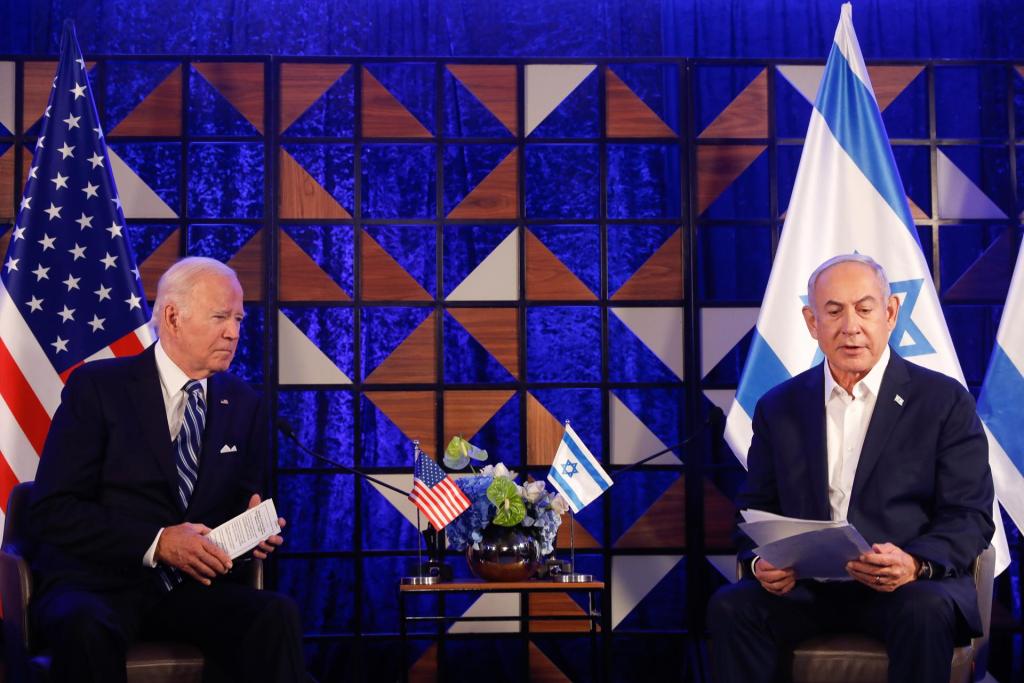The State of Israel, the United States and their mutual misunderstandings

As the 76th anniversary of the creation of the State of Israel grows nearer, the bilateral relations with the U.S. reaffirm their strategic character, but at the same time they display the existing misunderstandings that are noticeable to public opinion in both countries and the rest of the world.
As usual, when Israeli micro-objectives have sought to challenge the macro-objectives of the superpower – or at least hope to do so -, the US government has applied the brakes by employing a soft power containment agenda.
On this occasion, when the actors are the Biden administration and the ultra-right nationalist and religious coalition, headed by the six-time Prime Minister and Likud leader, Benjamin Netanyahu, the discrepancies have been manifest, in the midst of unresolved and tumultuous events taking place in the Middle East.
Since December 30, 2022, when the ultra-right coalition took over the government, Israel had been plunged into an ordeal marked by rallies and street demonstrations in the main cities of the country with the participation of hundreds of thousands of people.
In that context, refusal prevailed over the executive’s attempts to impose changes aimed at curtailing some civil rights and weakening the independence of the judiciary (Supreme Court), which has played the role of guarantor of the representative democratic system that substantially benefits the Jewish population.
Whether it is due to the desire of the radical right-wing forces that make up the government coalition, or to Netanyahu’s own interests, who has three cases pending before the courts, the fact is that, if the conceived plans were to be imposed, the country would have to face the threat of sharper polarization.
At the same time, the Israeli government had pursued an escalation of provocations, supplemented by an unjustified repressive wave against the Palestinian population which, as was foreseeable, also appealed to the possible widespread resistance until the outcome of the armed attack by Hamas against the State of Israel from the Gaza Strip.
The situation described underlines the notion that Israel is immersed in an existential crisis which the government tries to alleviate by resorting to the concept of national security, to which Netanyahu has appealed, repeatedly, in less favorable moments of his performance as Prime Minister, or when he has been questioned by the local justice system.
On the other hand, the expression of religious radicalism, with political projection, is a result of the evolution of that Jewish social segment which had as a catalyst the possibility of peace between Israel and Palestine (Oslo agreements). The subsequent transcendental step would have been the realization of the two states, a pending project which still garners the support of the international community and the USA, formally reaffirmed by the Biden administration.
At this moment, the Biden administration and the Israeli coalition have several key issues of coincidence in foreign policy matters, which determine the bilateral strategic relationship, such as the animosity towards the Islamic Republic of Iran and its allies in the region, as well as the effort of continuity in favor of the implementation of the Abraham Accords.
It is worth mentioning that the debate in the US establishment is a reality, which has had in President Biden himself a proponent critical of the performance of the ultra-nationalist Israeli coalition government and its current Prime Minister, who has repeatedly displayed his political differences with Presidents Clinton, Obama and Biden, i.e. Democratic administrations.
In addition to the above, there are published analyses and articles involving renowned liberal, neoconservative and pro-Zionist American academics and experts, whose approaches illustrate the political moment that the bilateral relationship is going through, marked by cooperation and tension; an episode already seen, but which is now reiterated in very peculiar circumstances, as of the events of October 7, 2023.
There is a relationship of opposing issues and topics between the two, which do not go unnoticed by politicians, academics and the press, especially those actions that the Biden administration has been implementing which are clear signs of opposition to the performance of the executive headed by Netanyahu.
Some of those important events, prior to October 7, 2023, are the following:
1. The absence of an Israeli government’s official condemnation of Russia for carrying out the Special Military Operation in Ukraine (While the outgoing executive did not move in that direction, the current coalition, headed by Netanyahu, did not move in that direction either in the first instance);
2. Not sending Israeli military supplies to Kiev during the first year of the military campaign, as demanded by the Ukrainian president, as well as Tel Aviv’s refusal to allow Volodymir Zelenski to visit the country;
3. A campaign to discourage investment in Israel, mainly from Europe, promoted by Washington, in view of what they identified as a moment of economic «slowdown» in the country.
In the section on bilateral ties with China, Washington’s misgivings in recent years should be taken into consideration in view of the growing exchanges between Tel Aviv and Beijing, involving investment in the high-tech sector, which is part of the evolving logic of the Chinese presence in the Middle East, with particular emphasis on the progress of the Belt and Road Initiative in the countries of the Persian Gulf.
For Gedaliah Afterman[1] «technological advances in areas such as artificial intelligence, quantum computing and surveillance technologies are redefining national security strategies»[2], which represent obvious priorities in this regional context.
An illustrative example of this statement was Netanyahu’s announcement in June 2023 of a possible visit by him to the People’s Republic of China, which did not occur before October 7, 2023, but showed the Zionist intention of encouraging this foreign policy projection in the midst of the rise of U.S. dissent with respect to Beijing.
However, the Hamas attack on the state of Israel changed the perception of the Zionist cabinet -and Netanyahu in particular- regarding the hypothetical role that the Asian giant could play in the face of such a markedly complex scenario[3].
«Perhaps Israel needed to think that at least the Chinese would be a little more considerate of its national security concerns and play a little more balanced role, rather than completely siding with the Arab countries[4],» observed scholar Yun Sun[5].
With the ongoing implementation of Operation Iron Swords against Hamas (primarily against the Gazan civilian population, as has been demonstrated), the misunderstandings between the Biden administration and the ultra-nationalist Israeli coalition government have ostensibly increased.
Washington supports the right of defense, and to this end has provided multi-million-dollar aid to its strategic ally in the Middle East, but has rejected indiscriminate attacks against the Gazan civilian population, as part of its damage control narrative. At the same time, by means of the White House presidential decree (January 2024), it intends to sanction Israeli settlers who commit diverse arbitrary actions against Palestinians in the West Bank.
The issue of the release of hostages in exchange for Palestinian prisoners has represented another setting of disagreement between the two governments, increasingly aggravated by the ability of Hamas to link this process with the prolonged cease-fire, which reveals the distinct intention of favoring the Qatari, Egyptian and American efforts to bring hostilities to an end and, thus, open the way to a potential negotiation in favor of the creation of a Palestinian state.
Netanyahu’s categorical refusal of Hamas’ proposal was made clear during the fifth trip of Secretary of State Anthony Blinken to the Middle East, with a stopover in Jerusalem[6]. Blinken ratified his government’s and his own decision to eliminate Hamas, for which purpose it will take months to implement Operation Iron Swords. Precisely on this matter, senior US intelligence officials estimated that only one third of Hamas fighters in Gaza have been killed, according to the influential Israeli daily Haaretz, in its «Israel at War» section[7].
It is obvious that Netanyahu is managing the current crisis with his sights set on the US presidential elections at times when Donald Trump emerges as the potential candidate of the Republican Party. In his previous presidency the Abraham Accords were put in place and Jerusalem was recognized as the capital city of Israel.
This explains Israel’s nonchalant determination to maintain the warlike response in the face of any other similar action by Hamas’ allies in the region, without apparent fear of escalation, to which Tel Aviv is accustomed in view of previous experiences of this type, especially after the events of the Yom Kippur War in 1973.
However, this episode was accompanied by a key negotiating dynamic, capitalized by Washington, under the leadership of Henry Kissinger, whose decisive role in the peace between Egypt and Israel ultimately had a visible benefit for the Jewish state, which also represented a notorious precedent for the signing of the Camp David Accords.
In connection with all the above, the specific weight and political sensitivity that the exchange of Palestinian prisoners for Israeli hostages entails for the State of Israel cannot be underestimated either.
Steven A. Cook, an expert at the Council on Foreign Relations, recalls the exchange in 2011 of a thousand Palestinians held in Israeli prisons for the private Gilad Shalit, who was in Hamas custody for five years. That agreement was reached under the auspices of Egypt and Germany and had an impact in public opinion, both locally and internationally.
At the close of this article, the international media echoed Moody’s decision to downgrade Israel’s credit rating, a decision repudiated by Netanyahu. This action shows the obvious hand the hand of the Biden administration in its soft power strategy against the ultra-nationalist coalition government and its Prime Minister.
[1] Dr. Gedaliah Afterman is head of the program Policy on Asia at the Abba Eban Institute for International Diplomacy in the Interdisciplinary Center, Herzlia, Israel.
[2] See https://www.infobae.com/america/mundo/2024/01/31/el-rol-de-china-en-medio-oriente-xi-jinping-encarna-la-falta-de-agilidad-de-beijing-en-la-region/
[3] See: https://www.cfr.org/blog/fickle-friends-sino-israeli-ties-buckle-amid-war-hamas
[4] See: https://www.infobae.com/america/mundo/2024/01/31/el-rol-de-china-en-medio-oriente-xi-jinping-encarna-la-falta-de-agilidad-de-beijing-en-la-region/
[5] Yun Sun is co-director of the China Project at the Stimson Center. A specialist in Chinas foreign policy and Us-China relations. Since 2011 to early 2014 she was associate visiting professor at the Brookings Institution. At the same time, she was named by the Global Development Program where she focused on Chinas national security decision-making processes and the China-Africa relations.
[6] See: ““Blinken meets Netanyahu, set to brief leaders on cease-fire, hostage talks”, Haaretz Daily Brief (7- 2-2024). Dorsey, James M. “Blinken finds a hardened political landscape as he tours the Middle East”. The Turbulent World. JamesMDorsey.net. Podscat. 82. 15:31 (8-2-2024).
[7] See: Israel at war: What you need to know-day 126. Haaretz. Israel al War. Israel News, Friday (09.02.2024).




Déjanos tu comentario